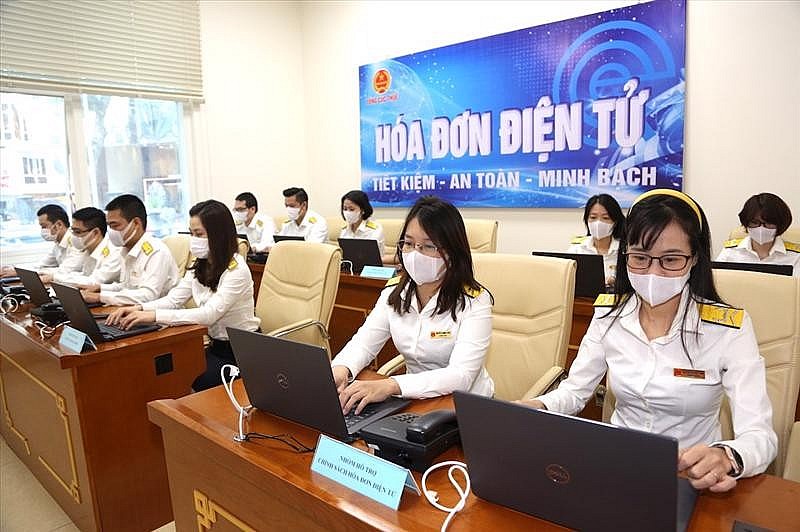Administrative reform plan of the General Department of Taxation for 2024 in Vietnam
What are the objectives and tasks of the Administrative reform plan of the General Department of Taxation for 2024 in Vietnam? – Thu Ha (Binh Phuoc)

Administrative reform plan of the General Department of Taxation for 2024 in Vietnam (Internet image)
Regarding this issue, LawNet would like to answer as follows:
On January 29, 2024, the General Department of Taxation issued Decision 101/QD-TCT on the Administrative reform plan of the General Department of Taxation in 2024.
1. Objectives of the administrative reform plan of the General Department of Taxation for 2024 in Vietnam
The objectives of the Tax Administration Reform Plan of the General Department of Taxation for 2024 include:
- Continuing to make efforts to enhance tax administration reform, ensuring effective implementation of the Comprehensive Administrative Reform Program of the State from 2021 to 2030, the Prime Minister's Directive on accelerating the implementation of the Comprehensive Administrative Reform Program of the State from 2021 to 2030, and the Tax Administration Reform Plan from 2021 to 2025 by the Ministry of Finance and the General Department of Taxation. This involves comprehensive and synchronized implementation, from institutional reform and administrative procedure reform to the development of e-government and digital finance in the field of taxation, contributing to socio-economic development, and meeting the demands of citizens and businesses.
- Affirming the position and role of the General Department of Taxation in leading and advising the Government and the Ministry of Finance in implementing tax management reform, aiming to build a strong national financial system, ensuring financial security, macroeconomic stability, and financial-monetary stability; mobilizing, managing, allocating, and utilizing financial resources. Strengthening the construction and improvement of legal systems regarding tax management innovation.
- Continuing to build and improve the tax legal system; enhancing the quality of market-oriented socialist economic institutions; ensuring coherence, modernization, and integration; organizing the strict and effective enforcement of laws; and enhancing the awareness of law compliance among citizens, businesses, and society as a whole.
Promoting administrative procedure reform in taxation, especially procedures directly related to citizens and businesses; administrative procedure reform must be practical, based on reality, with tangible and substantial results, not just formalities.
- Striving to have at least 70% of administrative procedures with financial obligations implemented through online payment, with a transaction rate of online payment reaching 30% or more; at least 85% of the results of administrative procedure resolution that are still valid and usable within the jurisdiction of the General Department of Taxation are digitized, ensuring connectivity and data sharing in administrative procedure resolution on electronic platforms; at least 70% of citizens and businesses do not have to provide information, documents, or papers that have been accepted in successfully completing previous administrative procedures, as they are already managed by competent state agencies or shared among state agencies.
- Continuing to review, streamline organizational structure, and complete the functions and tasks of tax authorities at all levels, ensuring agility, transparency, cleanliness, strength, modernization, and effectiveness; promoting state management decentralization in the field of taxation; and building a rational structure of tax officials and civil servants that meets the standards of job titles, positions, and competency frameworks as prescribed.
- Building the General Department of Taxation to serve and prioritize citizens and businesses, enhancing the effectiveness of the entire industry through digital tools, contributing to innovation in working methods, identifying the application of information technology as an effective tool to support and promote administrative reform in taxation, enhancing the productivity and efficiency of tax authorities at all levels, and improving the quality of public services provided to citizens and businesses.
- Upholding the proactive spirit, creativity, and determination to eliminate local interests, group interests, and personal interests; mobilizing all resources; engaging the participation of the entire political system and business community; and citizens in building and developing new models and initiatives, applying them in practice; and creating prominent achievements in the near future with the principle of "putting citizens and businesses at the center, as the subject and target, as the driving force; using the satisfaction of citizens and businesses to evaluate effectiveness."
- Strengthening the responsibility of leaders for organizing the implementation of administrative reform in taxation; clearly defining the achieved results, specific tasks associated with the responsibilities of units and individuals in charge, and allocating resources to ensure the implementation of administrative reform tasks; enhancing inspection, supervision, and objective evaluation of the implementation of administrative reform tasks by units within the tax sector.
2. Administrative Reform Tasks of the General Department of Taxation for 2024
The 2024 Administrative Reform Plan of the General Department of Taxation sets out several tasks, including administrative reform tasks as follows:
- Strictly implement the legal provisions on tax administrative procedure control; assess the impact of tax administrative procedures during the drafting of legal normative documents; rigorously review the regulations on tax administrative procedures in the draft legal normative documents to ensure compliance with the Law on Promulgation of Legislative Documents 2015; and enhance inspections of tax administrative procedure control.
- Regularly review and evaluate administrative procedures during implementation; restructure processes; reduce and simplify complex and overlapping administrative procedures that cause difficulties for individuals and organizations; eliminate unnecessary and unreasonable document components; integrate and reduce forms, declarations, and unnecessary documents or duplicate information based on the application of digital technologies and existing databases; develop and provide online public services and online payments as specified in Circular 01/2023/TT-VPCP.
- Conduct statistics, updates, and publicize administrative procedures, business conditions, and reporting regimes in the management field on the National Public Service Portal, the General Department of Taxation's e-Portal, and the Consultation and Inquiry Portal for Business Regulations to ensure compliance, timeliness, accuracy, and consistency.
- Continue to effectively implement the Program to simplify regulations related to business activities, ensuring that by 2025, at least 20% of regulations are reduced and simplified, and at least 20% of compliance costs related to business activities are reduced in the effective documents until May 31, 2020, in accordance with the requirements of Resolution 68/NQ-CP dated May 12, 2020, of the Government.
- Digitize records and results of administrative procedure resolution in accordance with the Government's regulations in Decree 45/2020/ND-CP dated April 8, 2020, Decree 107/2021/ND-CP dated December 6, 2021, Circular 01/2023/TT-VPCP dated April 5, 2023; implement the circulation of administrative procedure resolution records within the internal units of the Ministry, subordinate to the Ministry, electronically, meeting the requirements of connectivity and data sharing to serve administrative procedure resolution, without requiring individuals or businesses to provide information, documents, or results of digitized administrative procedures or shared from national and specialized databases as prescribed.
- Continue to effectively implement Decision 1865/QD-BTC dated September 13, 2022, of the Ministry of Finance approving the Project on Innovating the Receipt and Return of Administrative Procedure Resolution Results under the One-Stop Mechanism of the Ministry of Finance and Decision 1866/QD-BTC dated September 13, 2022, of the Ministry of Finance issuing the Regulation on Implementing the One-Stop Mechanism in Administrative Procedure Resolution of the Ministry of Finance. Continue to organize the implementation and operation of the One-Stop Department of Tax Authorities at all levels to ensure stability; implement the receipt and return of administrative procedure resolution results on time, ensuring 100% compliance for individuals and organizations; and enhance the satisfaction levels of individuals and organizations with the services provided by the Tax Authorities.
- Continuously review and propose options to simplify internal administrative procedures within state administrative agencies under the management scope of the Ministry of Finance from 2022 to 2025, according to Decision 1085/QD-TTg dated September 15, 2022, and Decision 2475/QD-BTC dated November 29, 2022, of the Ministry of Finance.
- Implement Decision 2443/QD-BTC dated November 24, 2022, of the Ministry of Finance on the Action Plan to implement Resolution 131/NQ-CP dated October 6, 2022, of the Government on enhancing administrative procedure reform and modernizing the methods of directing and managing services for the people and businesses; strengthen the responsibility of the heads of agencies and units under the General Department of Taxation in improving the quality of services in the implementation of administrative procedures and the provision of online public services.
- Receive, process, and respond to feedback and suggestions from people and businesses regarding difficulties and obstacles in implementing mechanisms, policies, and administrative procedures related to production, business activities, and the daily lives of individuals within the management scope of the General Department of Taxation.
- Enhance research and propose solutions to remove obstacles in mechanisms, policies, and administrative procedures, and suggest measures to reduce the time and costs of implementing administrative procedures in the tax field through increased dialogue and consultation with the people and businesses; actively seek opinions and interact with the people and businesses through consulting tax policies on the Consultation and Inquiry Portal for Business Regulations of the Government.
- Strengthen inspection, monitoring, and evaluation of the effectiveness and satisfaction of the resolution of administrative procedures for people and businesses. Implement the application of the Index for directing, managing, and evaluating the quality of services for people and businesses in the implementation of administrative procedures and public services in real-time on the electronic environment, according to Decision 766/QD-TTg dated June 23, 2022, of the Prime Minister, Decision 1507/QD-BTC dated July 29, 2022, of the Ministry of Finance, and Decision 1262/QD-TCT dated August 10, 2022, of the General Department of Taxation.
- Implement the tasks assigned by the Prime Minister specified in Directive 27/CT-TTg dated December 27, 2023, on continuing to promote reform measures and improving the effectiveness of resolving administrative procedures and providing public services for people and businesses.
For more details, please refer to the Administrative Reform Plan for 2024 of the General Department of Taxation issued together with Decision 101/QD-TCT.
- Key word:
- Administrative reform plan
- in Vietnam
- Number of deputy directors of departments in Vietnam in accordance with Decree 45/2025/ND-CP
- Cases ineligible for pardon in Vietnam in 2025
- Decree 50/2025 amending Decree 151/2017 on the management of public assets in Vietnam
- Circular 07/2025 amending Circular 02/2022 on the Law on Environmental Protection in Vietnam
- Adjustment to the organizational structure of the Ministry of Health of Vietnam: Certain agencies are no longer listed in the organizational structure
- Vietnam aims to welcome 22-23 million international tourists in Vietnam in 2025
-

- Emergency response and search and rescue organizations ...
- 10:29, 11/09/2024
-

- Handling of the acceptance results of ministerial ...
- 09:30, 11/09/2024
-

- Guidance on unexploded ordnance investigation ...
- 18:30, 09/09/2024
-

- Sources of the National database on construction ...
- 16:37, 09/09/2024
-

- General regulations on the implementation of administrative ...
- 11:30, 09/09/2024
-

- Notable new policies of Vietnam effective as of ...
- 16:26, 11/04/2025
-
.Medium.png)
- Notable documents of Vietnam in the previous week ...
- 16:21, 11/04/2025
-
.Medium.png)
- Notable documents of Vietnam in the previous week ...
- 16:11, 02/04/2025
-
.Medium.png)
- Notable new policies of Vietnam to be effective ...
- 16:04, 02/04/2025
-
.Medium.png)
- Notable new policies of Vietnam effective from ...
- 14:51, 21/03/2025

 Article table of contents
Article table of contents
